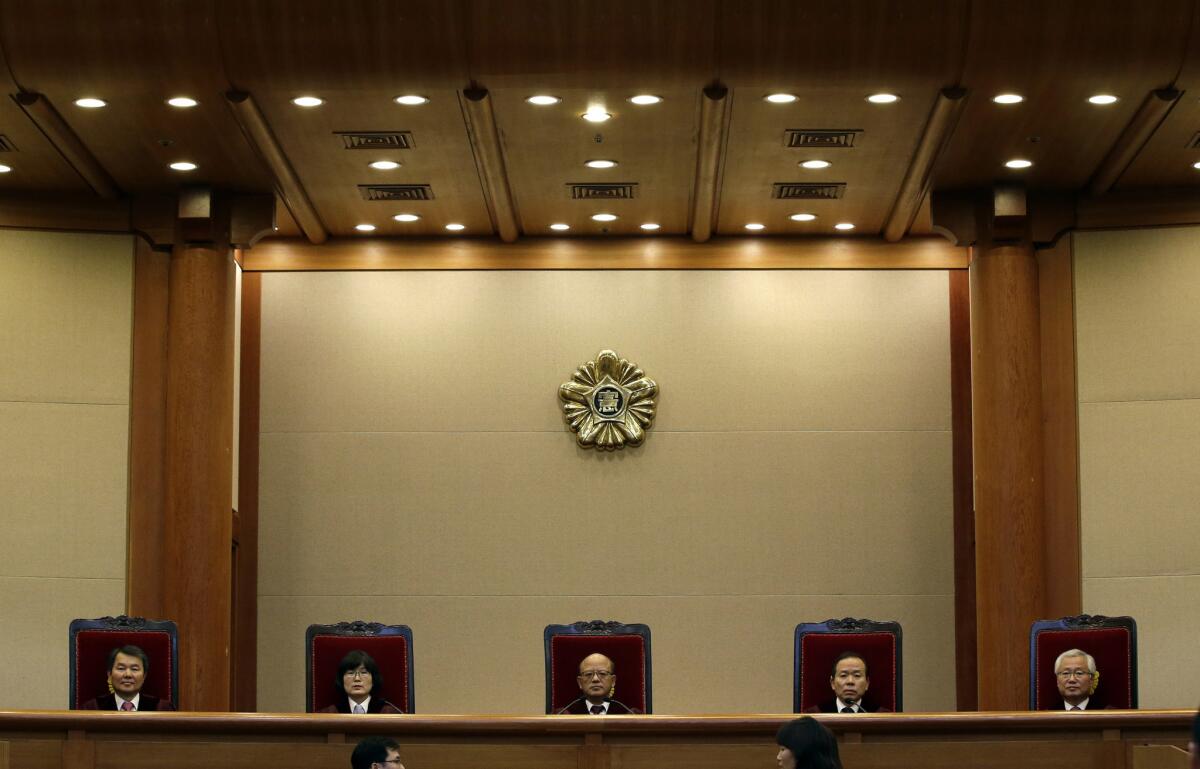South Korea makes cheating legal; decriminalizes extramarital affairs

- Share via
Reporting from Seoul — In South Korea, it’s now legal to be unfaithful. The country’s Constitutional Court voted Thursday to strike down a longstanding law that criminalized adultery.
Seven of nine judges voted to nullify the law on extramarital affairs, which has been on the books since 1953, calling it an unconstitutional limit on personal freedom.
“Even if adultery should be condemned as immoral, state power should not intervene in individuals’ private lives,” said presiding judge Park Han-Chul, according to the Agence France-Presse news agency.
Those in favor of the law had argued that it protected families by creating a disincentive to cheat, while opponents called it an unjust intrusion by the state into private matters.
In any South Korean city, it isn’t hard to spot signs of infidelity. Clustered around any train or bus station are “love motels” whose customers include people having affairs and privacy-seeking young couples who still live with their parents.
The law called for sentences of up to two years in prison. Adultery cases were only heard when a spouse filed a complaint, and could be withdrawn at any time by that spouse.
According to data from the court, 53,000 South Koreans have been indicted on adultery charges since 1985, including almost 900 last year. Few of them ever served time in prison, according to the Supreme Prosecutors’ Office.
Under Thursday’s ruling, anyone convicted of adultery since 2008 could have their charges dismissed, or be eligible for a retrial, court officials told local media. The law was last reviewed by the Constitutional Court in 2008, when judges voted to uphold it.
Reuters news service reported that stocks in Unidus Corp., a maker of latex for condoms and other products, shot up 15% after the ruling.
The adultery law came into the spotlight last year when South Korean authorities banned the Korean version of the hookup website Ashley Madison, which targets married people with the slogan, “Life is short, have an affair.”
South Korean authorities initially gave Ashley Madison permission to operate in March of last year, and the site quickly became popular, reporting more than 50,000 subscribers in its first week.
But regulators pulled the plug the following month. In a statement at the time, theKorean Communications Standards Commission calledAshley Madison a threat to “relevant laws aimed to protect healthy sexual morals, marriage bonds and family life.”
Ashley Madison then argued that its website was merely a forum for the exchange of information and not for any illegal acts.
“I obviously don’t want to take credit for the court coming to recognize the archaic nature of the law,” Ashley Madison Chief Executive Noel Widerman said in an email. “But I am positive that Ashley Madison’s presence in South Korea forced at least a look in the mirror and review of [whether] this law made sense in the Internet age.”
Borowiec is a special correspondent.
More to Read
Sign up for Essential California
The most important California stories and recommendations in your inbox every morning.
You may occasionally receive promotional content from the Los Angeles Times.













